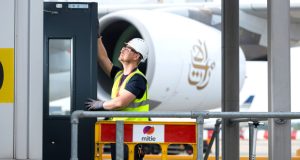 Blog from Rory Murphy Commercial Director, VINCI Facilities
Blog from Rory Murphy Commercial Director, VINCI Facilities
Richard Edelman the CEO of Edelman research who recently issued the 2019 trust barometer survey concluded that “People have low confidence that societal institutions will help them navigate a turbulent world, so they are turning to a critical relationship: their employer.” Edelmans conclusion is that “The growth of social media platforms fully shifted people’s trust from a top-down orientation to a horizontal one in favor of peers or experts. Now we are seeing a further reordering of trust to more local sources, with ‘My Employer’ emerging as the most trusted entity, because the relationships that are closest to us feel more controllable.”
We see this erosion of trust in the current clamor for Facebook and other social media providers to deal with fake news and explicit content. We see this erosion of trust in the inability of our governing bodies in this country to deliver any tangible outcome from Brexit. We see this erosion in the lack of belief that business leaders generally to do the best for their businesses and not just themselves. All these ingredients produce a toxic mix where people struggle to truly understand who they can trust.
So how do we respond within FM to allay the fears of the thousands that work within our industry and what is our responsibility as employers? At Workplace Futures this year there was certainly a more socially biased tone, whereby we were treated to presentations around responsible business practices, balanced procurement, advances in the measurement of Social value and the benefits of Social enterprises to name just a few. People and communities have come to the fore, our collective responsibility as a sector to support both our teams and the wider community within which they live and work is now firmly within the FM psyche and would seem to support Edelman’s hypothesis.
Running businesses that balance the economic, social and environmental aspects of everything they do to support their sustainable long-term goals is no longer the stuff of theory. Businesses that blindly followed a path of growth for growths sake at whatever cost in the pursuit of ever reducing bottom line margins are now having to take some very serious medicine. A number of very high-profile businesses, despite ‘surviving ‘over the last few months will need a generation of FM delivery to trade themselves out of their liabilities.
What does responsibility mean in our sector from the perspective of our business leaders? If we address this from a stakeholder viewpoint; our people expect us to run the operations in a way that supports and nurtures their careers, our teams expect business leaders to take a long-term view and build sustainable and rewarding jobs for all. Our teams want safe working environments which are inclusive and respectful, while receiving fair reward for the roles they undertake. Edelman suggests that our people also rely heavily on their employer to communicate clearly and honestly.
The Supply Chain who support our operations expect fair payment practices, open and transparent procurement activities. They crave collaboration and want recognition for the expertise and value they add.
The communities that we support and work within, expect businesses to give something back and to generate tangible and necessary social value. They expect us to respect the environments and give opportunities for local employment and SME engagement. Our clients expect businesses to take a responsible approach to our obligations and ensure compliance and safety are paramount.
Customers expect professionalism and demonstrable competency and the ability to deliver against clearly defined standards.
The final stakeholder can often be shareholders or parent company. This group expects our leaders to be responsible about the management and exposure to risk, the financial and commercial valuation of our works, the ethics, values and way in which the business operates and delivers.
Business leaders need to create a culture of responsibility and need to live and breathe the values by which the business should operate. They need to be set clear direction and standards and most of all they need to understand their responsibilities to deliver sustainable performance. We all have a role to play in rebuilding the trust that Edelman concludes is sadly absent. It’s time we began to take those responsibilities seriously.




